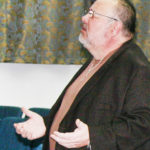Writing and Research
First of all
Like a painter, before she begins, she must know what she intends to paint. A sculptor needs to know what his statute looks like before he starts chipping away at the stone. And, a writer, as well, must know what the finished product will consist of to be able to succeed at writing a coherent and interesting paper. In other words, you will need to think carefully about what you are writing about.
Writing for New Life is not the same as writing for yourself. When you write for yourself, you can express any views you want, agree or disagree with any issues you confront, and even bring up topics and issues that are not inherent to the views of New Life. But, when you write for New life, as one of its representatives, your views, opinions, and comments, must be aligned with the Vision and Mission of New Life. This means you must make yourself familiar with these two writings which direct this ministry.
Secondly
You need to be able to answer the unstated questions: who, what, when, where and why? Not necessarily in that order, and not necessarily each and every one of these questions. Nevertheless, each and every writing stemming from New Life, must answer the basic questions of why and what. Why did you write that article and what is the reader supposed to understand from reading it?
To answer the first (why), you need to ask yourself why you are writing the article.
- What is it that you want the reader to learn or know?
- Why do you want them to learn or know that?
- How will it benefit them or others?
- Why should they even care?
- And so on.
To answer the second (what), you need to ask yourself what has to be included into the contents.
- Will I need a chart?
- Will I need pictures?
- How deep do I need to get into the subject?
- Will simple examples be enough to explain my point?
- Do I need statistics?
- Do I need to quote anyone?
- And so forth.
Answering the unstated questions above is not just simply including the words in the writing and then answering them. In fact, professional writers simply answer these unstated questions in how they write their articles. For example, a writer can write, “Because of my love for the Lord, I have chosen to spend considerable time in prayer and fasting, which I tend to do early in the mornings. This has helped me to grow in maturity and gain much patience in dealing with issues in my life. I believe that others who follow this pattern will benefit greatly in their own walk with Jesus. Whether it is a prayer closet, a comfortable chair, or whatever setting, find time to reach out to the Lord. You will be blessed.” Notice that in this example, the writing answers the questions, who, what, when, where, and why, without mentioning the questions directly.
So, before you begin writing, be sure you have the answers to the unstated questions. This will make your writing easier, clearer, understandable, and more enjoyable.
Thirdly
You need to do some research. Well, maybe lots of research. Okay, there will tons of research. But, research is your friend as a writer. Let’s get one thing clear to begin with, no one wants to know your opinion, unless they specifically tell you that they do. As a character in a police TV show long ago used to say, “Just the facts, ma’am.” Even though you will not be including a list of all the items you researched for every writing, you must be able to answer where you got that information. If you say that something is true, you must be able to show how you reached that conclusion. If you refer to some statistical facts like “it is well known that drug-addicts do this or that,” then you must be able to sustain your argument with a reference to the location or person you got that data from.
In addition, the more you research a subject the better you know that subject. Writers of popular books will often be see and acknowledged as being knowledgeable and acquainted with their subject matter. For example, J. R. R. Tolkien’s “Lord of the Rings,” took him 17 years to write. Why 17 years? Because Tolkien researched his characters, the circumstances they did and would find themselves in, and how they would deal with those things while still remaining true to the lore that included elves, goblins, hobbits, and so forth. The stories had to sound as if they could be true, under those conditions. This required him Tolkien to write, and then rewrite, portions of his books until they all squared with each other. He had tons of material, which were never included in the books about each character in the book, each storyline, and so on. This material was just his own research that helped him write the books in the manner he wanted.
So, What Is research?
The dictionary defines it as:
1: careful or diligent search
2: studious inquiry or examination
- Especially: investigation or experimentation aimed at the discovery and interpretation of facts, revision of accepted theories or laws in the light of new facts, or practical application of such new or revised theories or laws
3: the collecting of information about a particular subject
We will be working with the first and third definitions, more so, than the second, which we will also include to a point.
A careful search means that the researcher is not in a hurry. Some researches will take a lot of time, while others can be done fairly quick. If the researcher is in a hurry, regardless of how much time they invest into the research, they will miss certain data, or misinterpret the data they find. The result will be a writing which is less than what could have been. It will either provide less information than what should be, or will misinform the readers due to a lack of evidential support. Evidential support is the data collected through the research.
A diligent search means that the researcher pays attention to what she is researching. Here again we have the unstated questions, who, what, when, where, and why. The researcher must work at answering these questions during the research process. If you take your time to answer these “unstated questions” during your research time, you will then find writing about your subject that much more easy to do.
Research – The Steps
- Select a topic, issue, or subject.
- Ask yourself why you want to learn more about this.
- What do you want to get across to the reader?
- What do you expect from the reader?
- Identify the sources available for the research.
- Do a search (google, for example).
- Identify physical books you may own that could help.
- Do you know someone who is an “expert” in this subject?
- Have you seen a documentary, movie, TV show about this subject?
- Identify the sources most like to provide you with the necessary data.
- Not everything that seems like it relates will truly relate (just because someone owns a dog does not prove they know about dog pedigrees).
- Look for material that clearly refers to, speaks of, or argues your intended subject material.
- Scan the material for keywords, phrases, and such.
- You don’t have to be a speed reader to quickly go through a document.
- You can scan for specific words or phrases that will help you identify whether the material is relevant or not.
- Using this technique, you can go through many documents much faster than trying to reader each word, and you will still find many related documents or writings.
- Copy and paste your selected data to a document intended for research material alone.
- Create a folder on your computer where you will be storing this researched data.
- In that folder, create a separate folder for each topic, issue, writing, or whatever best helps you find the information later.
- Copy and paste any data you find into a Word document and save it to your research folder.
- Don’t worry, you have lots of room on your hard drive.
- Organize your researched data.
- If you create separate folder for the various topics, themes, issues, and so forth, you will make your writing life easier.
- Write your paper.






